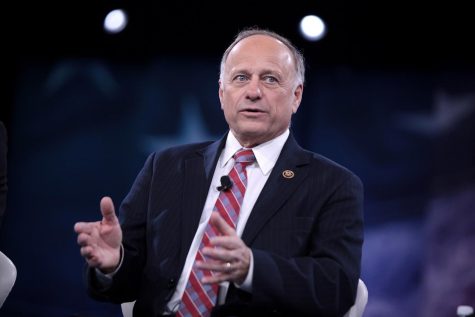Jaimes: Proposed cigarette tax is an unsustainable solution
Legislation for increased tobacco tax is expected to be discussed in the legislature, with the solutions proving to be unsustainable and only perfect in theory.
Rows of cigarettes line the wall behind the counter at The Den in Iowa City on Wednesday, Aug 26, 2015.
February 20, 2019
Since the start of the new legislative session in Iowa, topics ranging from criminal justice, education, and health-care reform have been discussed as priorities. One proposal on the table is a tobacco tax on cigarettes aimed to “discourage kids from starting smoking and help adults quit the habit,” according to public-health officials cited in the Des Moines Register. Anti-smoking advocates expect this legislation to hit the state Legislature soon.
In speaking to students about the proposal, all said that a tax on the deathly behavior would be a good way to generate money for the government and decrease the habit. And to many, it would appear that way at face value.
RELATED: In Their Own Words: How do students feel about a proposed cigarette tax?
Taxes on unhealthy behavior are known as “sin taxes,” and the idea behind them is to, hopefully, tax whatever the state deems unnecessary into extinction. Our neighbors to the east in Illinois have seen added taxes on mileage, sugary drinks, and any activity considered to be “amusing” (sorry to people who think they can enjoy their PlayStations without approval from the government).
The sole purpose behind these taxes is to discourage behavior associated with the items but painted in a compassionate light. They perfectly summarize the selfish nature of the government.
The flawed logic that an increased tobacco tax is out of kindness for its users point to two misunderstandings of politics: that the government is capable of working for anyone but itself and that throwing money at any problem can be the proper solution.
Although this proposal was backed by the American Lung Association, which has reason to advocate for measures that encourage healthier living, it will not be the only one reaping the benefits.
Supporters of the tax have concluded that the increase would generate $101 million annually. From that, only $9 million would go into funding anti-tobacco programs and counseling for smokers. Iowa currently invests $5.7 million in this cause.
That figure, $101 million, is a lofty number for a tax that, if implemented properly, should theoretically decrease annually until the habit is obsolete.
Given that scenario, what else would replace this tax that would sustain as much revenue as was once generated from taxing tobacco products?
The other possible outcome is that the state knows its attempt at social engineering will fall short of expectations and become reliant on the millions of dollars gathered, all while using smokers as pawns to accumulate more money.
And pawning off victims to pursue an agenda is something both left and right sides of the government do best.
For many years, politicians have pleaded for a tax and tight regulation on e-cigarettes, which are a healthier alternative to combustible cigarettes and have been promoted by the American Cancer Society. If this wish were granted, along with an increased tobacco tax, we would leave a community of people without healthy alternatives that could help ease an addiction. There is no compassion in the truth of these realities, and they are contradictory to the reasons cited by advocates to the legislation.
RELATED: UI’s tobacco ban difficult to enforce as students continue to smoke on campus
The flawed logic that an increased tobacco tax is out of kindness for its users points to two misunderstandings of politics: that the government is capable of working for anyone but itself and that throwing money at any problem can be the proper solution.
Sin taxes not only reflect an overreaching government controlling as many aspects of an individual’s life as possible, but the fact that it will search for any short term “solution” that will add to its wallet and take away from yours. These taxes lead to slippery slopes and should be considered at a level deeper than just face value.





















